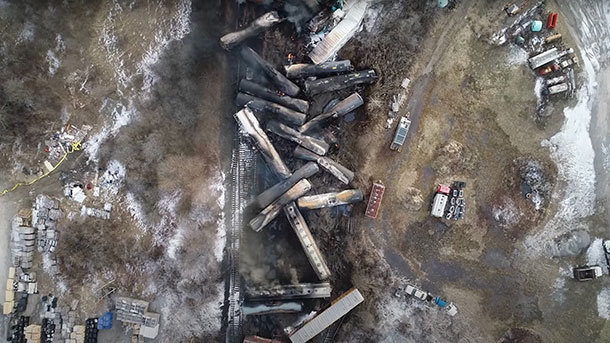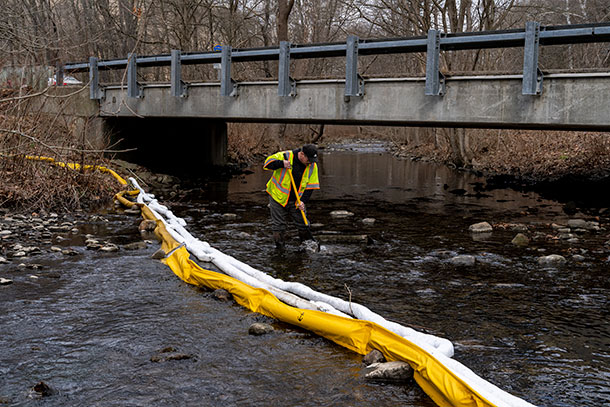News & Politics
East Palestine was ‘H.G. Wells War of the Worlds stuff’
The February train crash along the Pennsylvania-Ohio border has people worried about their health and the future of their communities.

Charred train cars sit near railroad tracks in East Palestine, Ohio on Feb. 14, 2023. Angelo Merendino/Getty Images
The derailment of a train near the Pennsylvania-Ohio border on Feb. 3 did more than release chemicals and contaminants into communities – it unleashed fear, as well.
In the weeks since the crash, government officials and residents alike have upped the pressure on Norfolk Southern, the railroad company that owns the train and the stretch of tracks where the derailment took place.
The derailment resulted in multiple fires, and the presence of chemicals in the train later forced Norfolk Southern to vent multiple train cars, releasing dangerous chemicals into the air to prevent an explosion that threatened to inundate the immediate area with shrapnel and fumes.

In the aftermath of what Norfolk Southern described as a “controlled release” of the vinyl chloride gas, the fears of Ohio and Pennsylvania residents living near ground zero have intensified – and those caught in the aftermath are pleading with Norfolk Southern, government officials and pretty much anyone else who will listen – to not just hear their concerns, but act on them.
And their concerns are many. Residents from around the affected area flocked to a legislative hearing held by the Pennsylvania Senate Veterans Affairs & Emergency Preparedness Committee, where they vividly described the health effects they’ve suffered since Norfolk Southern vented toxic vinyl chloride gas from the train – and asked questions that have yet to be answered.
“My home is approximately 200 feet from the Norfolk Southern rail line, which is approximately 1,800 feet from the actual point of derailment,” said Lonnie Miller, an East Palestine, Ohio resident who testified at a hearing in Pennsylvania. “On Friday, Feb. 3 at approximately 8:55 (a.m.), our lives became a living nightmare.”
Describing flames and clouds of smoke coming from the site of the derailment, Miller said: “It was the scene from a disaster movie that you don’t want to live in.”
Miller told lawmakers that many residents in East Palestine live paycheck-to-paycheck, which made it difficult when the governors of Ohio and Pennsylvania asked residents within a one-mile by two-mile radius to evacuate.
On Pennsylvania’s side of the border, residents of Darlington, which is roughly seven miles from East Palestine, shared similar concerns about their health and the future of their community with the Senate committee, where they voiced concerns about air quality, water contamination – and a drop in the value of their properties.

Jonathan Kent described the scene following the derailment as “H.G. Wells War of the Worlds stuff,” with helicopters, law enforcement and local leaders flooding the region. Another Darlington resident, Amanda Kemmer, said she kept her children home and opted not to evacuate – a decision she later came to regret.
Speaking of the chemical release, Kemmer told the committee: “You just saw this big black cloud, this big, ominous cloud coming out from over East Palestine and it just came towards us and up over our house until the whole sky was black.”
“By the end of the evening everyone had a headache and didn’t feel well and was sick to their stomach,” Kemmer said, fighting back tears. “At that point, I knew I made the wrong decision to stay.”
Other residents who attended the hearing reported myriad health issues in the days following the crash, including headaches, a dry cough, a lingering chemical smell inside the nose, rashes and sinus congestion, among other symptoms.
According to the U.S. Environmental Protection Agency, short-term exposure to vinyl chloride through the air can cause dizziness, drowsiness, headaches, and irritation of the eyes and respiratory tract. It’s also known to cause liver damage and can increase the risk of a rare form of liver cancer, per the EPA.
The agency has ordered Norfolk Southern to pay for the cleanup and decontamination efforts, and if the company fails to comply with the work outlined in the order, it could be forced to pay triple damages to the EPA.
Contamination of soil near the derailment site exists, as well as some water sources in the area, according to the EPA. And while the EPA has assured people in the area that air quality in the East Palestine area “remains normal according to air monitoring data,” health risks from the release of vinyl chloride and the potential water contamination resulting from it is still a cause for concern, said Myron Arnowitt, the Pennsylvania state director for Clean Water Action.
“I don’t really know in what language you can call it a controlled release, because it was very uncontrolled,” Arnowitt said in an interview. “We don’t know exactly where the chemicals went with precision.”
Arnowitt added that streams contaminated from the burning of vinyl chloride gas could already be a source of air pollution for those living in the area. “The streams themselves are clearly an air source of chemical contamination for local residents … because the chemicals involved, they’re gassing off from the stream and that’s a clear indication that the water was contaminated.”
Government officials and residents alike have criticized Norfolk Southern’s response efforts in the weeks following the crash, and are pressing the company to do more to help affected residents in both Ohio and Pennsylvania.
Led by GOP state Sen. Doug Mastriano, the state Senate Veterans Affairs & Emergency Preparedness Committee voted to subpoena Norfolk Southern President and CEO Alan Shaw after Shaw didn’t show up to testify at the February hearing in Beaver County.
The committee also hinted at the potential for more subpoenas if the company doesn’t provide the panel with data and documents requested in the subpoena’s cover letter.
Norfolk Southern did not respond to multiple requests for comment inquiring about their response to the crash, criticism from public officials and the legislative subpoena. Shaw, however, will testify before the U.S. Senate about the derailment, according to Reuters.
Democratic Gov. Josh Shapiro’s administration in late February announced the creation of a health resource center in Beaver County, where people can sign up for free water testing and receive guidance on food and animal safety. Per the administration, 200 Pennsylvanians visited the center in the first two days after it opened.
Shapiro wrote to Shaw on Feb. 14, accusing the railroad of “creating confusion” at the scene of the crash by failing to adhere to unified command procedures. He also accused Norfolk Southern of using inaccurate information and conflicting modeling about the release of vinyl chloride gas.
“While I appreciate that responding to train derailments presents an array of complex challenges, failure to adhere to well-accepted standards of practice related to incident management and prioritizing an accelerated and arbitrary timeline to reopen the rail line injected unnecessary risk and created confusion in the process,” Shapiro wrote. “You can be assured that Pennsylvania will hold Norfolk Southern accountable for any and all impacts to our commonwealth.”
Shapiro announced nearly a month later that he had met with Shaw regarding the derailment, and that Norfolk Southern will pay more than $7 million to fund cleanup and response efforts. Local fire departments in western Pennsylvania will receive $5 million to replace equipment, while another $1 million will go to a community relief fund that will be run by officials in Beaver and Lawrence counties.
Another $950,000 will be directed toward the state Department of Environmental Protection, and $400,000 will be paid to the state Department of Health. Norfolk Southern will also pay $30,000 to cover staff time at the Pennsylvania Emergency Management Agency, according to Shapiro’s office.
Additionally, the National Transportation Safety Board revealed that an axle on one of the trains overheated, prompting the crew on the train to begin slowing it down. NTSB Chair Jennifer Homendy said that the axle, on the 23rd car, later failed. “During this deceleration, the wheel bearing failed, car number 23 derailed and the train initiated an emergency brake application and came to a stop,” she said at a press conference.

The NTSB announced on March 7 that they are opening a special investigation of Norfolk Southern’s “organization and safety culture.”
Shaw, in a message to the East Palestine community posted to Norfolk Southern’s website on Feb. 19, said the company remains committed to helping residents and that he understands the fears, anger, and frustration of people affected by the derailment.
“I know you also have questions about whether Norfolk Southern will be here to help make things right,” he wrote. “My simple answer is that we are here and will stay here for as long as it takes to ensure your safety and to help East Palestine recover and thrive.”
To date, Norfolk Southern Corporation has donated $300,000 to the East Palestine School District, and provided a local fire department with $825,000 to cover equipment costs. The company also set up a $1 million charitable fund to support the local community. At press time, the company reported providing more than $21 million in support to the East Palestine community.
Norfolk Southern defended itself in a statement after the NTSB released a preliminary report on the train’s wheel bearing troubles, stating that the rail crew was operating within company rules, and that heat detectors that monitor the temperature of wheel bearings were working correctly.
“Under the supervision of the Federal Railroad Administration, the company has inspected all wayside detectors in the area of the incident and found they were operating as designed,” Norfolk Southern said in a statement. “Out of an abundance of caution, Norfolk Southern is now inspecting all of the nearly 1,000 wayside heat detectors on its system – on top of the regular inspection of the detectors every 30 days.”
With investigations into the derailment still ongoing, legislators at the state and federal levels are already looking to prevent the next East Palestine.

U.S. Sens. Bob Casey, John Fetterman, Sherrod Brown and J.D. Vance, among others, introduced legislation in early March that would establish new safety requirements for trains that transport hazardous materials, increase the frequency of rail car inspections for cars containing such materials and setting new requirements to lower the risk of wheel bearing failures.
At the state level, Republican state Rep. Louis Schmitt is introducing legislation that would require freight trains to have at least two crew members in the cab operating the train. “While we are limited in the Pennsylvania legislature as to what we can do since the federal government has jurisdiction over rail, we are not without recourse,” Schmitt wrote in a recent memo to colleagues.
U.S. Rep. Mike Kelly, a western Pennsylvania Republican, called on the EPA to broaden the one-mile radius evacuation zone around East Palestine so communities in the western part of the state can access federal resources, including air monitoring and water quality testing.
"The evidence has shown that wildlife has been negatively impacted by chemicals and hazardous materials for miles around the crash site,” Kelly said in a statement. “Local residents have expressed serious concerns that their own land and water may be as well. It’s time for answers."
Democratic U.S. Rep. Chris Deluzio has also sponsored legislation, known as the DERAIL Act, that would broaden the federal definition of a “high-hazard flammable train” to include any train transporting certain classes of flammable substances – like vinyl chloride.
The bill, Deluzio said, “changes the definition of a high-hazard flammable train to include chemicals, like vinyl chloride, that now are not part of that definition, which means they aren't subject to the stricter safety rules.”
“I think that has to change,” he added.
In the absence of any legislative response, residents will have opportunities to connect with government officials to relay any issues they’re experiencing. Acting Pennsylvania Attorney General Michelle Henry created a hotline and online complaint form for those impacted by the derailment, while the NTSB will be holding a fact-finding hearing in East Palestine this spring.
It just may be a while until everyone affected gets the answers they’re looking for.
“This is something that’s going to require monitoring for a considerable amount of time to really understand,” Arnowitt said. “Where did chemical exposure go? What are the pathways? What has gotten contaminated that we need to address? Those are all questions which, while we know some of the answers, the agencies who are smart are recognizing that we don’t know all the answers yet, and we need to make sure that we’re looking.”
NEXT STORY: Gov. Josh Shapiro’s first budget by the numbers
